The Picture Book Buzz - Interview w/Jane Godwin, Sylvia Morris and Review of Found You!
- Maria Marshall
- Sep 22
- 13 min read
Jane Godwin Jane Godwin is the highly acclaimed author of over forty books for children and young people, across all styles and ages. Her work is published internationally, and she has received many commendations.
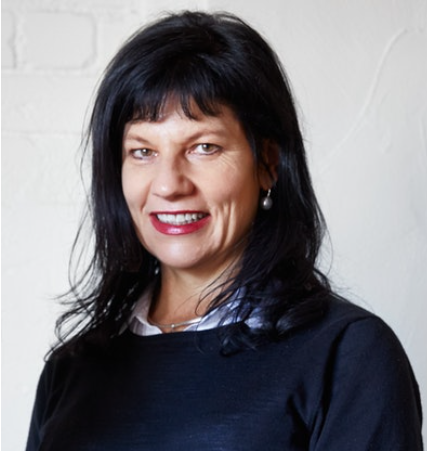
Jane was the Children's Publisher at Penguin Books Australia for many years and produced books for a wide range of readers, from very young children through to YA titles. In 2024, Jane won the Pixie O’Harris Award for her contribution to the children’s book industry.
Jane is dedicated to pursuing quality and enriching reading and writing experiences for young people. She lives in Melbourne, Australia.

She’s the author of 44 books, including Look Me in the Eye (2025), Can You Teach a Fish to Climb a Tree?, illustrated by Terry Denton (2024), Families, illustrated by Yael Frankel (2024). The Best Hiding Place, illustrated by Sylvia Morris (2023), A Life Song, illustrated by Anna Walker (2023), A Walk in the Dark (2022), Families, illustrated by Yael Frankel (2022), Let’s Build a Boat, illustrated by Meg Rennie (2022), Polly's Grand Party Plan, illustrated by Evie Barrow (2022), Don't Forget, illustrated by Anna Walker (2021), Arno and His Horse, illustrated by Felicita Sala (2021), and When Rain Turns to Snow (2020).
Sylvia Morris is a children’s illustrator and science enthusiast. She grew up in the Adelaide Hills, on the traditional lands of the Kaurna and Peramangk peoples, and has a Master’s degree in Pure Mathematics.
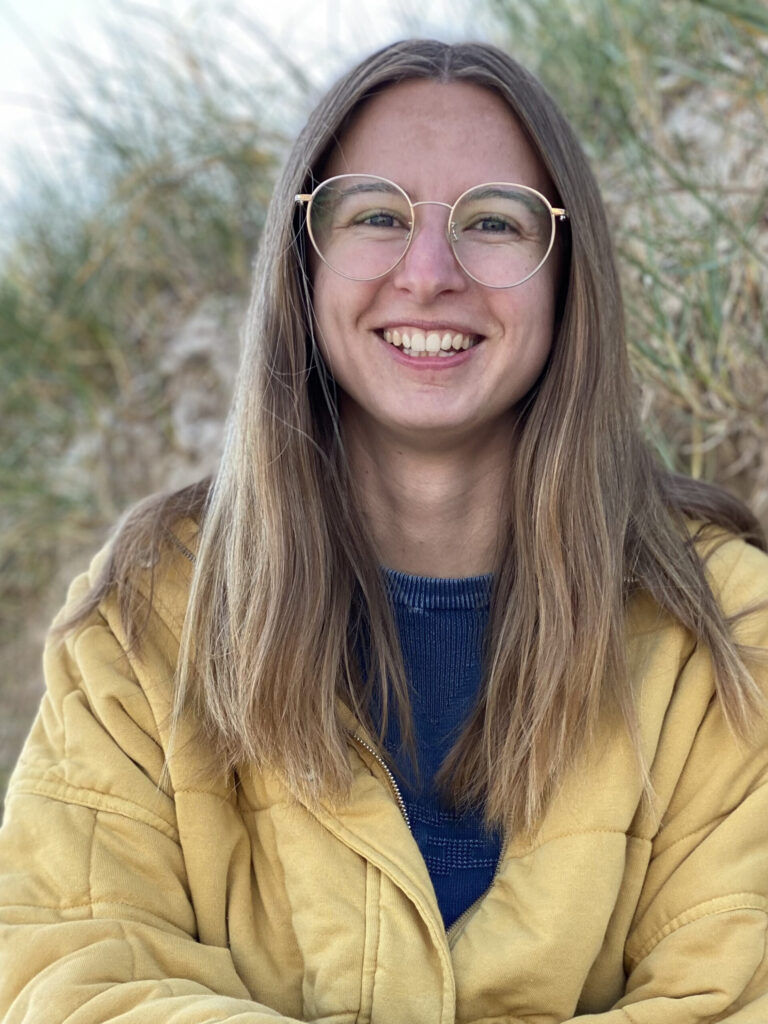
While studying for that Master’s degree, Sylvia got really excited by learning to draw and discovered how much she loves illustrating. It combines two of her favourite activities: reading and problem solving.
Sylvia is also the cover illustrator for Amelia Mellor’s The Grandest Bookshop trilogy, and Nicki Greenberg’s The Detective’s Guide series. She has been illustrating for The School Magazine since 2018.

She’s the illustrator of 7 books, including When the Stars Come Out by Tanya Hill (2024), The Opal Dinosaur by Yvonne Mes (2024), It Takes A Village, by Penny Harrison (2024), and The Best Hiding Place by Jane Godwin (2023).
Their newest picture book, Found You!, released on September 9th in the U.S..
Welcome Jane and Sylvia!
Thank you!
Hi, thanks for having us, Maria!
Tell us about yourself. (Where/when do you write, illustrate, or translate? How long have you been writing, illustrating, or translating? What is your favorite type of book to write, illustrate, or translate?)
JANE - I’ve been writing for young people for over 30 years now. I write across the age groups, from books for toddlers to teenage fiction, and everything in between. I also worked as a publisher for many years, and in that role I published books for all ages as well. I love to create picture books – they are probably my first love! But I enjoy writing all types of books. A picture book is always a more collaborative project, whereas writing a novel is more insular.
SYLVIA - I was not an arty kid at all, and I was firmly headed down a STEM pathway. But when I was struggling with my post-graduate mathematical studies, I started observational drawing as a form of meditation. It quickly took over my life and gave me a way to make a career out of the one thing I’d always wanted to make a career of: reading! I love to read a text and make lots of notes about themes, characters and motifs, and try to get in the head of the author. And it’s not like being an editor, or reviewer, where I need to be critical - I just get to dive in.
Then I get to take all of that analysis and figure out how to support the text as best I can. I find that act of collaboration to be really special and rewarding. So really any good piece of writing is my favourite thing to illustrate!
It's great to "meet" you both. What is one of the most fun or unusual places where you’ve written a manuscript or created an illustration?
JANE - I write everywhere! At the moment I’m writing a novel set on a giant salt lake called Lake Tyrrell, so I have been exploring that area (in north-western Victoria, Australia) and scribbling away as I trudge across the salt lake.
SYLVIA - I love to sketch on trains. Something about the movement through places, and a bit of boredom, is quite conducive to exploring different ideas. All the final illustrations happen at my desk though - somewhat boring, sorry!
Not boring at all! Trains and trudging across a salt lake sound fun. Jane, what was your inspiration or spark of curiosity for Found You!?

JANE - I was re-reading Donald Winnicott’s iconic book Playing and Reality, and I was struck by his words ‘It is a joy to be hidden, and disaster not to be found.’ That got me thinking about the traditional, well-loved game of hide-and-seek, and realizing that although it appears simple, it’s actually rich with meaning. No wonder it has endured for centuries and throughout the world! Hide-and-seek reflects a child’s personal development. It’s a game that deals with both sides of our selves – the private, ‘hidden’ self, and the communal, public self. We love to hide, but being found, being discovered for who you are, is also a great joy. Hide and seek is a game of aloneness and togetherness, and the power and intensity of both. These ideas fed into the story.
I also have strong memories of playing hide-and-seek as a child. We lived in a big old tumbledown house that had lots of places to hide.
I love the connections you drew out from the game to our lives. Sylvia, what about the Found You! manuscript appealed to you as an illustrator?

SYLVIA - For me, it was all about the main character Archie. His internal life forms the bulk of the story, and he felt so real and relatable to me. I was super interested in exploring his emotions and finding ways to depict them.
You did an excellent job! How many revisions did Found You! take for the text or illustrations from your first draft to publication?
JANE - Probably about ten drafts.
SYLVIA - Hmm, we went back and forth a lot in the storyboard stage. Maybe three complete rounds of drafts. And then I did the finals, and then a round of revisions at the end too.
Not too bad. The book was released in Australia as The Best Hiding Place. Besides the title and cover, do you know what changes occurred between the versions?

JANE - There are a couple of minor changes on one or two pages, but apart from the title and cover, the two books are almost identical.
SYLVIA – We took the eyebrows/stitch lines off the teddy to make him less scary! I showed a US librarian friend both versions, and she was somewhat horrified by the Australian teddy, which reassured me that it was an important change to make. In the end, I’m pretty happy that a good adjustment could be made so simply.
Interesting, I'm glad that it didn't require a lot of adjustment. I do have to say I love both covers/titles (especially Tilda jumping on the bed, before hiding underneath it). Jane, what was the toughest part of writing Found You!? What was the most fun?
JANE - The toughest part for me is always paring back the text so that only the words that are absolutely necessary remain! Probably the most fun, or maybe the most interesting, was seeing that the structure of the game of hide-and-seek mirrors a story structure – the setting off on the adventure of finding a place to hide, the thrill of being hidden and the mounting tension of hearing the searchers looking for you, the moments of suspense, the threat that maybe you won’t be discovered, that you’ll be abandoned, and finally the resolution of being found.
That's cool. Sylvia, what was the toughest part of illustrating Found You! ? What was the most fun?
SYLVIA – The toughest part was for sure the house layout. First, finding one that worked for all my compositions, then making sure I had all the right rooms in all the right doorways. I do like the way it all feels connected, but it took a lot of diagrams to get there. The most fun was probably the storyboard. I loved exploring all the different ways the story could go.
I can just imagine how complicated that got. Sylvia, many illustrators leave treasures or Easter eggs in the illustrations. Did you do this? If so can you one or more with us?
SYLVIA – I didn’t really do this deliberately… I did want a few background stories though, so you can follow the cat’s little journey, and there are a few items that fall out of the cupboard and are then picked up by the other children.
That's fun! Jane, did anything surprise or delight you when you first saw Sylvia’s illustrations? Which is your favorite spread?
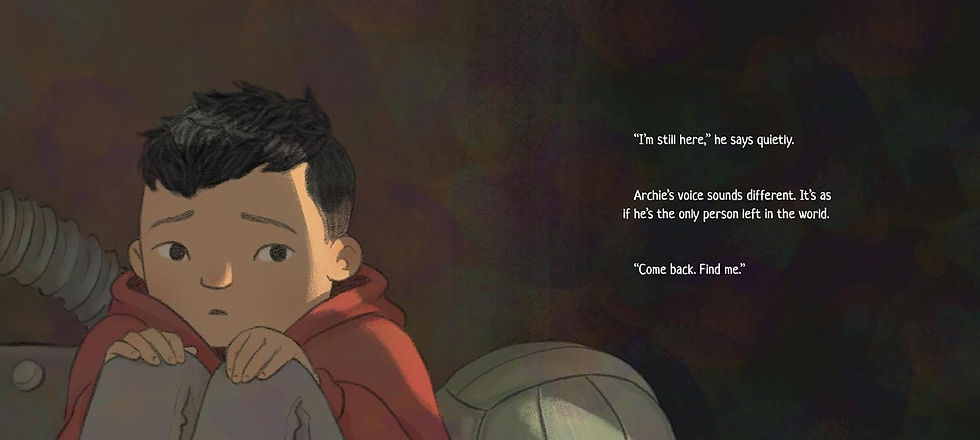
Text © Jane Godwin, 2025. Image © Sylvia Morris, 2025.
JANE - I love the way Sylvia handles the use of light throughout the book. It wasn’t an easy text to illustrate, since a lot of the story takes place in the dark. I also think Sylvia cleverly showed the layout of the house, and where everyone is at any given time. My favourite spread is the ‘I’m still here’ double page with Archie alone in the dark.
This is such an emotionally powerful spread. I agree with you that Sylvia did an amazing job with the illustrations! Sylvia, is there a spread that you are excited about or proud of? Which is your favorite spread?
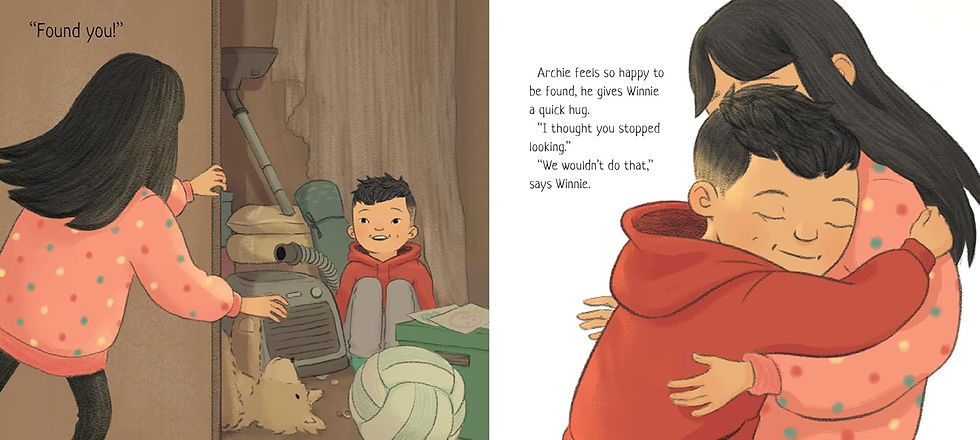
Text © Jane Godwin, 2025. Image © Sylvia Morris, 2025.
SYLVIA - My favourite is the page when Archie is found. I really wanted to capture Archie’s joy and relief, while also acknowledging that, for Winnie, this is just a normal game where her little brother happened to find a good hiding spot. So, she is a bit surprised and perplexed by the hug and, as an older sister, I wanted to capture that feeling.
You did so perfectly! Jane, having written about 42 picture books, do you have a procedure or method you find helpful? Did Found You! (The Best Hiding Place) follow this method?
JANE - Well, I have to admit that I don’t really have a procedure or method! Each project is completely different and requires its own unique approach. However, with each project I do always make dummy books of my own, like little practice books, and read them out loud over and over again. This helps me clarify which words/sentences are absolutely necessary and also helps with the performance aspect of the picture book, and the drama and tension of the turning of the page and where each page turn should fall in the story.
Dummy books are so helpful. Is there something you want your readers to know about or discover in Found You!?
JANE - I always find that the meaning of a book varies from person to person. Everyone perceives the book in their own way, reflecting their own experience and personality. I suppose what interested me was how the game of hide-and-seek has endured in every culture, and why this might be so. I feel that it’s reflective of the two sides of our selves – the desire to hide away, and the desire to be found or known.
SYLVIA - That it’s normal to have big, deep, complex emotions. There’s nothing silly about how Archie feels. His meditative sense of peace, and his later fear and unease, are both valid and they’re emotions that we all experience.
Part of what I love the most about this book is your ability to capture Archies' conflicting and changing emotions. Are there any projects you are working on now that you can share a tidbit with us?
JANE - I’m working on a picture book that explores spatial concepts for very young children. I’m also working on the novel set on the salt lake (mentioned earlier) which is a kind of ghost story. And my long-time collaborator Anna Walker and I are working on our tenth picture book together.

SYLVIA - I’ve only just started on a new picture book about working together, but I don’t think I can share anything there yet. I do have two books that are just about to come out in Australia though. The Great Shark Egg Case Hunt by Kasey Whitelaw, is an international journey of beachcombing and citizen science, including a stop in Alaska, where we find the egg case of a big skate (Beringraja binoculata). The other one, Bear to the Rescue by Romane Cristescu & Nic Gill, .tells the story of the real-life detection dog, Bear, who saved koalas after the Black Summer bushfires in 2019-2020. Both are published with CSIRO Publishing.
These all sound intriguing. I hope these two get released in the US, too. And we'll have to keep our eyes open for your other books. Last question, what is your favorite National Park or Forest, regional park, or city park (anywhere in the world)? Or the one you’re longing to visit. Why?
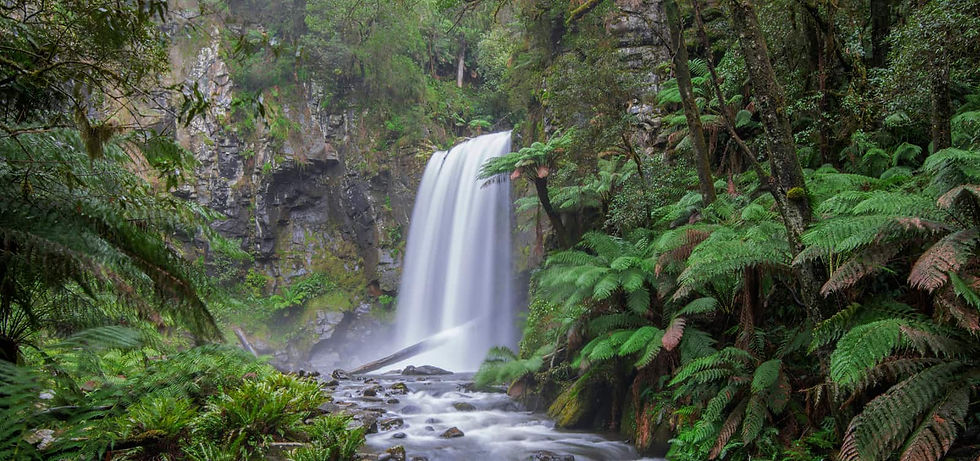
© Lenny-K-Photography
JANE - Oh, I have so many! I love the Great Otway National Park in Victoria, Australia. It’s so varied, and covers wild coastline, mountains, waterfalls, and towering mountain ash trees. I love to hike in that part of the world. And a favourite city park would have to be Central Park in NYC – I have visited there several times. Another city park I love is Bryant Park, also in NYC. When I was travelling in New York with my daughter a few years ago, her boyfriend flew over from Australia and surprised her by proposing to her in Bryant Park by the fountain!
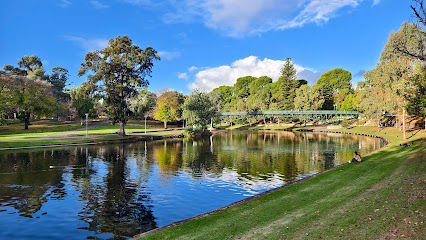
© Tim Tairly
SYLVIA - I’m moving back to Australia in a few months, after spending three years in Germany, and I think one of the things that will make me feel truly at home is the parklands that ring the Adelaide CBD. I love European trees too, but they are so different from Australian ones, and I miss the trees from home a lot. I can’t wait to walk the familiar paths again.
Thank you so much, Jane and Sylvia for stopping by and sharing with us. It was a pleasure chatting with both of you.
To find out more about Jane Godwin, or contact her:
Website: https://www.janegodwin.com.au/
Instagram: https://www.instagram.com/janiegodwin/
To find out more about Sylvia Morris, or contact her:
Website: https://www.sylviamorris.com.au/
Review of Found You!
A favorite game in childhood, most kids have played hide-and seek. It's an exciting game that can be played just about anywhere. But what happens if you find too good a place to hide? This fun and touching book explores the mix of emotions that can be elicited in this game - the anticipation of discovery, worry about co-inhabitants of your space, and fear of being forgotten. It's a wonderful picture book that explores a range of emotions that occur in the game of hide-and-seek, and more generally in life.

Found You!
Author: Jane Godwin
Illustrator: Sylvia Morris
Publisher: Charlesbridge (September 9, 2025)
Ages: 5 -9
Fiction
Themes:
Hide- and-seek, feeling alone, anxiety, and being found.
Synopsis:
Hide-and-seek is fun. Until it's not . . . but maybe it's okay after all! For every kid who has ever had an anxious moment during play.
A very relatable story for 5-9-year-olds that acknowledges all of the big feelings and questions that kids ponder, in this social-emotional picture book.
Archie and his friends are playing hide-and-seek in the house. He finds the best hiding place. But is it too perfect? Will they ever find him? The question every kid has wondered at different times.
There's fun and joy and sometimes worry in a great game! And it's even better when everything turns out well in the end!
With wide-ranging appeal, Found You! is sure to be a relatable, comforting read for any kid who has ever played the game.
Opening Lines:
“One, two, three,
four, five, six, seven,
eight, nine, ten . . .”
Quick!
Here?
Here?
What I LOVED about this book:
First off, I was grateful to the illustrator and publisher that they did a "role call" before the game started and five kids scrambled throughout the house. it is such an ingenious way to make it easier to track the five member cast as they set off hiding for a game of hide-and-seek.

Text © Jane Godwin, 2025. Image © Sylvia Morris, 2025.
The opening immediately grounds the reader in the game, without ever mentioning it by name. The colorful image erupts with action as all but one child scurry to find a hiding place. This was one of my favorite games as a child and finding that perfect place was always a challenge. I love the vignettes of Archie looking and experimenting with possible hiding spots. This is such an active and engaging opening!
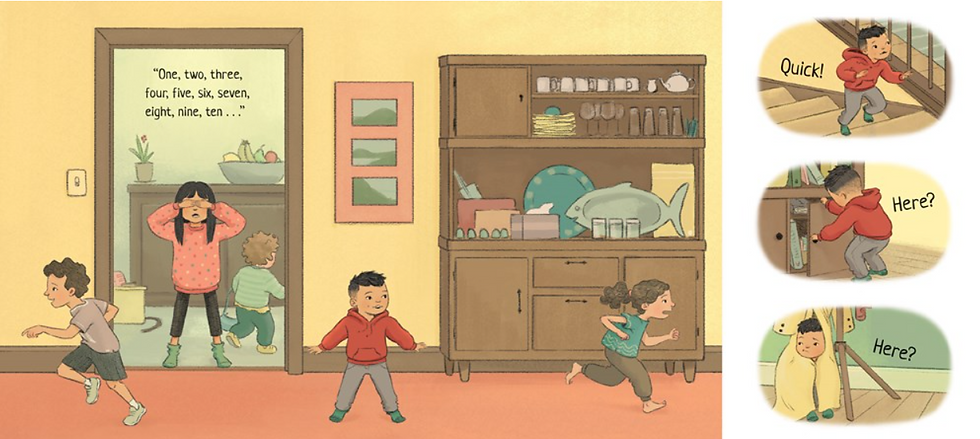
Text © Jane Godwin, 2025. Image © Sylvia Morris, 2025.
As Archie finally hides in a cupboard in the office, the girl, Winnie, begins looking for the others. She finds one behind the curtain (shoes sticking out) and the youngest in the clothes hamper (again). As the three join forces to search upstairs, very close to where he is hidden, Archie barely breathes. Has he found the perfect hiding spot? The three stand quietly to 'See if we can hear them."
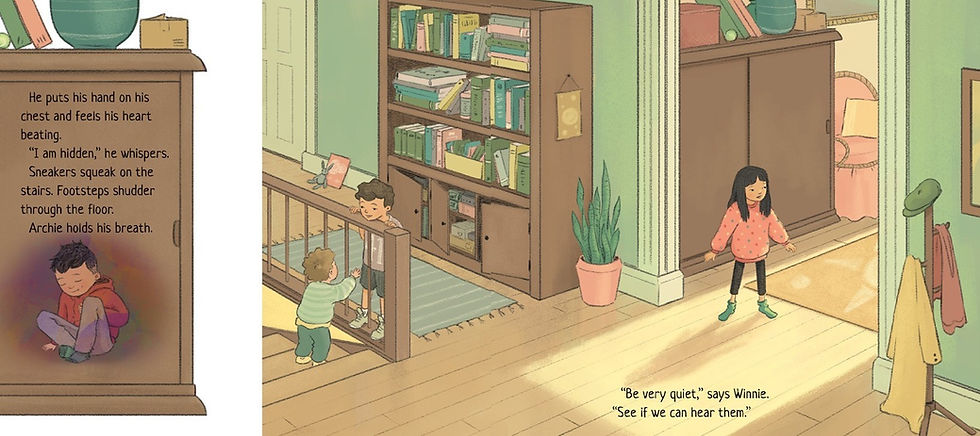
Text © Jane Godwin, 2025. Image © Sylvia Morris, 2025.
At first Archie's excited to fool the others, but when their footsteps fade off and he hears nothing, he starts to worry. Have they forgotten about him? I really enjoyed the variety and dual points of view that Sylvia Morris created in her illustrations. Showing us both Archie, tucked into a dark cupboard and the others searching. Interestingly, when the book was initially released in Australia, under the title The Best Hiding Place, the cover had a great cut-away view of the house interior with the kids searching for hiding spots.

It was fun to see this other cover, as the next illustration, in the U.S. version, is an awesome, similar cutaway view into the house showing Archie still hiding and the others looking under the bed when Tilda sneezes, "Ah-choo!" "Found you!"
But Archie truly has found a superior place to hide. Or has he? As he sits in the dark alone, his worry turns to panic, as he worries about what might be there with him (spiders?), and whether everyone has forgotten him? Especially after he shifts, things tumble and bump, and still nobody comes. Didn't they hear the noise? Have they gone on to do something else without him?
Big feelings of suddenly being alone, unseen, or forgotten are gently explored through Archie's fears and worries during the game of hide-and-seek. The book does a great job of creating a safe place to experience all of these emotions and lets the reader explore them on their own comfort level. The ending is tender, rewarding, and re-affirming both to Archie and the reader. Wonderful touches of humor sprinkled throughout the illustrations, provide emotional relief and more than a few snickers.
Resources:
thinking of your house or yard (or wherever you've played or wish you could play hide-and-seek), where would you hide? Write a description, or draw a picture, of your hiding place. If you've hidden there, how long did it take others to find you?
have you ever wished you could just hide and not be seen? Have you ever felt invisible and wish to be seen?
check out a couple of fun twists on Hide-and-Seek (here) and (here), or for younger kids.
pair this with Pete the Cat Plays Hide-and-Seek by Kimberly and James Dean, Little Bear's Big House and The Bear's Song by Benjamin Chaud, and Invisible Jerry by Adam Wallace, illustrated by Giuseppe Poli.























Wonderful interview! Learned so much. Thanks and congratulations!